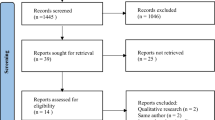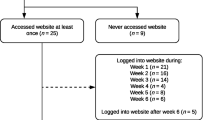Abstract
Background. Look Good Feel Better (LGFB) aims to help women manage appearance-related side effects of cancer and its treatment. In this pilot study, we assessed the impact of LGFB workshops on self-image, social interactions, perceived social support, and anxiety. Methods. We administered scales preworkshop and postworkshop participation. We conducted semistructured telephone interviews following attendance. Results. Statistically and qualitatively, subjects experienced significant improvement in self-image, social interaction, and anxiety. Participant anxiety decreased, but greater social support was anticipated than actually obtained. Conclusions. LGFB workshops increase self-image, improve social interactions, and reduce anxiety.
Similar content being viewed by others
References
Devlen J, Maguire P, Phillips P, et al. Psychological problems associated with diagnosis and treatment of lymphomas. II: prospective study. Br Med J (Clin Res Ed). 1987;295:955–957.
Fulton C. The prevalence and detection of psychiatric morbidity in patients with metastatic breast cancer. Eur J Cancer Care. 1988;7:232–239.
Hopwood P, Howell A, Maguire P. Psychiatric morbidity in patients with advanced cancer of the breast: prevalence measured by two selfrating questionnaires. Br J Cancer. 1991;64:349–352.
Maguire P. Improving the recognition of concerns and affective disorders in cancer patients. Ann Oncol. 2002;13(suppl 4):177–181.
Massie MJ, Holland JC. Overview of normal reactions and prevalence of psychiatric disorders. In: Holland JC, Rowland JH, eds. Handbook of Psychooncology: Psychological Care of the Patient With Cancer. New York: Oxford University Press; 1989:273–282.
Pinder KL, Ramirez AJ, Black ME, et al. Psychiatric disorder in patients with advanced breast cancer: prevalence and associated factors. Eur J Cancer. 1993;29A:524–527.
Zabora J. The prevalence of psychological distress by cancer site. Psychooncology 2001;10:19–28.
Parker PA, Baile WF, De Moor C, et al. Rsychosocial and demographic predictors of quality of life in a large sample of cancer patients. Psychooncology. 2003;12:188–193.
Hesketh PJ, Batchelor D, Golant M, et al. Chemotherapy-induced alopecia: psychosocial impact and therapeutic approaches. Support Care Cancer. 2004;12:543–549.
Münstedt K, Manthey N, Sachsse S, et al. Changes in self-concept and body image during alopecia induced cancer chemotherapy. Support Care Cancer. 1997;5:139–143.
Carpenter J, Brockopp D. Evaluation of self-esteem of women with cancer receiving chemotherapy. Oncol Nurs Forum. 1994;21:751–757.
Rosman S. Cancer and stigma: experience of patients with chemotherapy-induced alopecia. Patient Educ Couns. 2004;52:333–339.
Helgeson VS, Cohen S, Schulz R, et al. Group support interventions for women with breast cancer: who benefits from what? Health Psychol. 2000;19:107–114.
Helgeson VS, Cohen S, Schulz R, et al. Long-term effects of educational and peer discussion group interventions on adjustment to breast cancer. Health Psychol. 2001;20:387–392.
Lindemalm C, Strang P, Lekander M. Support group for cancer patients: does it improve their physical and psychological wellbeing? A pilot study. Support Care Cancer. 2005;13:652–657.
Meyer TJ, Mark MM. Effects of psychological interventions with adult cancer patients: a meta-analysis of randomized experiments. Health Psychol. 1995;14:101–108.
Michael YL, Berkman LF, Colditz GA, et al. Social networks and health-related quality of life in breast cancer survivors: a prospective study. J Psychosom Res. 2002;52:285–293.
Montazeri A, Jarvandi S, Haghighat S, et al. Anxiety and depression in breast cancer patients before and after participation in a cancer support group. Patient Educ Counsel. 2001;45:195–198.
Rosenbaum E, Gautier H, Fobair P, et al. Cancer supportive care, improving the quality of life for cancer patients. A program evaluation report. Support Care Cancer. 2004;12:293–301.
Look Good Feel Better. Look Good Feel Better Web site. Availble at: http://www.lookgoodfeelbetter.org or http:www.lookgoodfeelbetter.ca. Accessed April 13, 2009.
Look Good Feel Better Designated Centre Brochure. Available at: Look Good Feel Better Designated Centre, Room 3–642 Princess Margaret Hospital, 610 University Avenue, Toronto, Ontario, Canada M5G 2M9.
Carr T, Harris D, James C. The Derriford appearance scale (DAS-59): a new scale to measure individual responses to living with problems of appearance. Br J Health Psychol. 2000;5:201–215.
Harris D, Carr T. The Derriford appearance scale (DAS59): a new psychometric scale for the evaluation of patients with disfigurements and aesthetic problems of appearance. Br J Plast Surg. 2001;54:216–222.
Sherbourne CD, Stewart AL. The MOS social support survey. Soc Sci Med. 1991;32:705–714.
Zimet GD, Dahlem NW, Zimet SG, et al. The multidimensional scale of perceived social support. J Pers. Assess. 1988;52:30–41.
Zimet GD, Powell SS, Farley GK, et al. Psychometric characteristics of the multidimensional scale of perceived social support. J Pers Assess. 1990;55:610–617.
Spielberger CD, Gorsuch RL, Lushene RD. Manual for the state-trait anxiety inventory. Palo Alto, CA: Consulting Psychologists Press; 1970.
Avery, J, Nyhof-Young J. Like a cleansing fire: exploring the impact of short-term groups for women with breast cancer. J Psychosoc Oncol. 2003;21:27–52.
Harris D, Carr T, Moss T. Manual for the Derriford appearance scale 59 (DAS59). Bradford on Avon, England: Musketeer Press; 2004.
Huynh N, Moore K, Catton P, et al. Look Good Feel Better: Evaluation of a workshop for lymphedema patients. J Cancer Educ. 2006;S21:87 (No. 27).
Gilda’s Club Worlwide, Gilda’s Club Worldwide Web site. Available at: http://www.gildasclub.org/home/default.asp. Accessed April 13, 2009.
Wellspring. A network of support centers for people with cancer and their loved ones. Available at: http://www.wellspring.ca/about/ index.html. Accessed April 13, 2009.
Willow Breast Cancer Support and Resource Services. Available at: http://www.willow.org. Accessed April, 13, 2009.
Carlson LE, Angen M, Cullum J, et al. High levels of untreated distress and fatigue in cancer patients. Br J Cancer. 2004;90:2297–2304.
Knobel H, Loge JH, Nordøy T, et al. High level of fatigue in lymphoma patients treated with high dose therapy. J Pain Symptom Manage. 2000;19:446–456.
Okuyama T, Tanaka K, Akechi T, et al. Fatigue in ambulatory patients with advanced lung cancer: prevalence, correlated factors, and screening. J Pain Symptom Manage. 2001;22:554–564.
Princess Margaret Hospital Breast Cancer Survivorship Program. Available at: http://www.survivorship.ca. Accessed April 13, 2009.
Caring Voices. Caring Voices Web site. Available at: http://www.caringvoices.ca/en. Accessed April 13, 2009.
Pitts, V. Illness and Internet empowerment: writing and reading breast cancer in cyberspace. Health (London). 2004;8:33–59.
Author information
Authors and Affiliations
Corresponding author
Rights and permissions
About this article
Cite this article
Taggart, L.R., Ozolins, L., Hardie, H. et al. Look Good Feel Better workshops: A “big lift” for women with cancer. J Canc Educ 24, 94–99 (2009). https://doi.org/10.1080/08858190802664594
Issue Date:
DOI: https://doi.org/10.1080/08858190802664594




